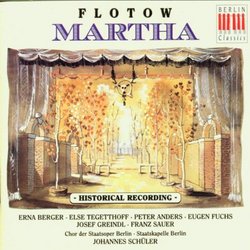| All Artists: Friedrich von Flotow, Johannes Schuler, Else Tegetthoff, Berliner Staatskapelle, Staatskapelle Berlin, Erna Berger, Peter Anders Title: Flotow: Martha / Schler, Berger, Tegetthoff, Anders, et al Members Wishing: 0 Total Copies: 1 Label: Berlin Classics Release Date: 9/20/1994 Genre: Classical Style: Opera & Classical Vocal Number of Discs: 2 SwapaCD Credits: 2 UPC: 782124216320 |
Search - Friedrich von Flotow, Johannes Schuler, Else Tegetthoff :: Flotow: Martha / Schler, Berger, Tegetthoff, Anders, et al
 | Friedrich von Flotow, Johannes Schuler, Else Tegetthoff Flotow: Martha / Schler, Berger, Tegetthoff, Anders, et al Genre: Classical
![header=[] body=[This CD is available to be requested as disc only.]](/images/attributes/disc.png?v=a4e11020) ![header=[] body=[This CD is available to be requested with the disc and back insert.]](/images/attributes/disc_back.png?v=a4e11020) ![header=[] body=[This CD is available to be requested with the disc and front insert.]](/images/attributes/disc_front.png?v=a4e11020) ![header=[] body=[This CD is available to be requested with the disc, front and back inserts.]](/images/attributes/disc_front_back.png?v=a4e11020) |
Larger Image |
CD Details |
CD ReviewsPrima ganz! Tip top! madamemusico | Cincinnati, Ohio USA | 08/17/2004 (4 out of 5 stars) ""Martha" is a German comic opera from the bel canto era that has retained its place in the repertoire - at least in Germany and Austria - on and off ever since. The plot, like most comic operas, is simple, but the music is unsurpassed in its lightness of spirit and melodic beauty. Flotow created a sound-world in which the characters can romp vocally, set to music that is bright, spirited, and refreshingly light for a German work. There have, however, only been three complete recordings of this work. This is the first, made in wartime Germany in 1944, and it has survived because of the excellent singing, sprightly conducting and joie-de-vivre it exudes. The second recording, made in 1967, featured Annaleise Rothenberger, Nicolai Gedda and Hermann Prey, but the conducting by the (very) aged Robert Heger was slow and pedantic, thereby killing the work's sprightliness and humor. The third recording, made in the mid-1980s, featured Lucia Popp and Peter Dvorsky. Dvorsky did not sing particularly well and, again, the conducting was not at the highest level, despite digital sound. Thus this ancient relic, available for years on the dull-sounding Urania LP label, has now been resuscitated for reissue on several CD labels. The Grammofono 2000 issue is the best, using Cedar and other digital processing to restore decent sound without damaging the fullness of sound of the original, but even with these miracle improvements there is still some blasting and distortion at loud peaks which detracts somewhat from one's listening enjoyment, which is why I only give it 4 stars. As for the performances, they are wonderful. Erna Berger sparkles as Lady Harriet (Martha), Peter Anders is a smooth and lyrical Lionel, Eugen Fuchs is a swaggering, colorful Plunkett, and Josef Griendl is a comically grumpy Tristan Meckleford. The plot centers around two gentleman farmers (Lionel and Plunkett) who hire two servant girls to help with the cooking and spinning; but the "servants" are Lady Harriet and her maid Nancy in disguise, just for fun, who are TERRIBLE at domestic chores! Unfortunately, poor Lionel falls in love with "Martha," who is actually royalty, so when she returns to her real life he is left high and dry. Fortunately, Lionel turns out to be a Count whose father was unfairly stripped of is lands and title, so Lady Harriet restores both and marries him. Plunkett, of course, gets the maid! Johannes Schuler, a name totally unknown to me, conducts with great brio, making sure that this is a comic souffle that will rise to great heights. As for the misguided person who condemned this recording because it was made during the Nazi era in Germany, please remember, many of these artists were only party members because they were forced to be, the same as Dietrich Fischer-Dieskau. Many of them, including Erna Berger, actually helped their Jewish friends escape the clutches of the concentration camps and gas chambers. Know who you are accusing before you point fingers. This is the kind of misinformation that condemned Kirsten Flagstad to nearly a decade of harassment for absolutely no reason! " Wonderful Historical Document William S. Levison | Valdosta, GA United States | 05/19/2002 (4 out of 5 stars) "This appears to be the only available recording of Flotow's absolutely delightful opera. Luckily, it is a terrific re-mastering of an early 40's recording featuring definitive performances as the two leads by Erna Berger and Peter Anders. The conducting is lively, and all of the performances convincing. Most surprising, the sound is amazingly good (the fact that it isn't up to "modern standards is the only reason for a less-than-perfect rating)." BRILLIANCE! William S. Levison | 09/22/2003 (5 out of 5 stars) "If you don't know ~ this IS ART - and artists - {they survive during the most peculiar times} at their best ... severly neglected, but shoud be reborn!More would be stupid ... just get this recording and surrender to this beauty. For the serious collector of unsurpassed vocal talent.{That is if this period of beauty means .....}"
|

 Track Listings (15) - Disc #1
Track Listings (15) - Disc #1